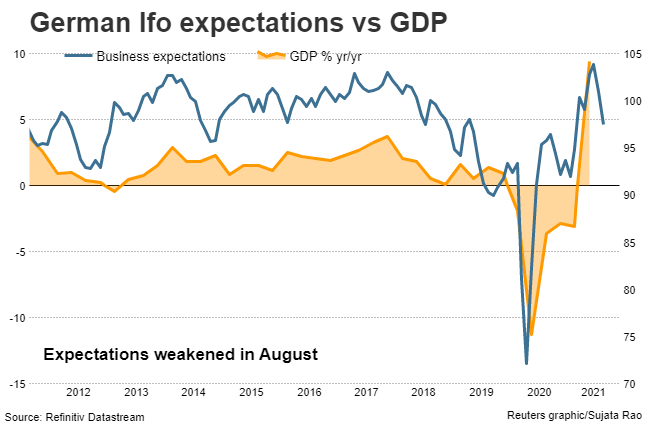BERLIN, Aug 25 (Reuters) – German business morale fell for the second month running in August, as supply bottlenecks and rising COVID-19 cases drove companies to take a dimmer view of the coming months in Europe’s largest economy, a survey showed on Wednesday.
The Ifo institute said its business climate index came in at 99.4, missing an analyst consensus of 100.4 in a Reuters poll and down from a downwardly revised reading of 100.7 in July.
“The mood in the German economy has clouded over again,” Ifo President Clemens Fuest said in a statement. “Supply bottlenecks for intermediate products in manufacturing and worries about rising infection numbers are putting a strain on the economy.”
Concerns were growing in the hospitality and tourism sectors in particular, he added.
Data on Tuesday showed the economy grew more than expected in the second quarter as the easing of COVID-19 curbs spurred consumers to dip into record savings piled up during the winter lockdown, and the state pressed on with a huge debt-financed stimulus push. read more
But with government officials warning of a fourth COVID-19 wave during the autumn, the months ahead look more problematic. read more
Ifo economist Klaus Wohlrabe told Reuters the outlook for that period gave cause for concern as 70% of industrial businesses surveyed complained about supply chain bottlenecks.
Earlier, the Statistics Office said German exports to China declined for the first time in nearly a year in July, easing by 3.9% year-on-year to 8.4 billion euros ($9.9 billion). read more
“The decline in German companies’ exports to China in July is a sobering sign,” said Volker Treier, head of foreign trade at the DIHK Chambers of Industry and Commerce, adding that shipping problems were disrupting international supply chains.
Earlier this month, BMW (BMWG.DE) raised its 2021 profit forecast after strong quarterly results, but said the global semiconductor chip shortage and rising raw materials prices would hurt its performance in the second half of the year.
Siegfried Russwurm, president of the BDI industry group, said the COVID-19 pandemic continued to cause problems, such as with closed ports in China. “The situation remains fragile,” Russwurm added, referring to the pandemic.
ING economist Carsten Brzeski said the Ifo reading pointed to a loss of economic momentum in the second half of the year.
“A levelling-off of GDP growth rates (then)… would imply that the German economy will not return to pre-crisis levels this year but only in early 2022.” he said.

Additional reporting by Christian Kraemer; Editing by Madeline Chambers and John Stonestreet
Our Standards: The Thomson Reuters Trust Principles.
from WordPress https://ift.tt/3sJAr9i
via IFTTT

Post a Comment